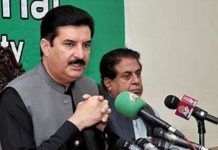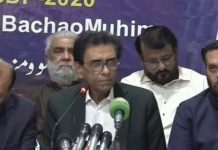RAWALPINDI: Director General of the Inter-Services Public Relations (ISPR), Lieutenant General Ahmed Sharif Chaudhry, on Friday said that the Pakistan Army has no interest in holding talks with political parties, stressing that the military should not be dragged into political affairs.
Speaking to BBC Urdu, the DG ISPR clarified that the armed forces engage only with the state — a state that is constituted under the Constitution of Pakistan and formed in cooperation with political parties.
“We speak to the state of Pakistan — the state formed under the Constitution with political parties,” he said. “Whatever government is in place at any given time, that is the state. And the Pakistan Army operates under that state.”
He reiterated that the Pakistan Armed Forces perform their duties within the framework of the Constitution and serve the state, regardless of which political party is in power.
He appealed to all quarters to avoid involving the armed forces in political matters, reaffirming the institution’s apolitical stance.
Furthermore, DG ISPR Chaudhry said that numerous rumours and assumptions are deliberately spread against the armed forces for political purposes. He said that one such rumour was that the army does not perform its duties and is involved in politics.
“When Ma’rakah-e-Haq came, did the army perform its duties or not?” he asked, affirming that the armed forces remain fully focused on their professional responsibilities.
“Our commitment lies with the people, regional integrity, sovereignty, and the protection of Pakistanis. This is the work the army does,” he said.
He questioned whether the nation had, at any point, felt the absence of the army in fulfilling its role. “No, absolutely not,” he said.
Lt Gen Chaudhry reiterated that the armed forces have always maintained a clear position that it is the job of politicians to engage in dialogue among themselves. “The Pakistan Armed Forces must not be dragged into politics,” he emphasised.
He also questioned why the name of the military leadership is brought up during periods of political instability. “This is a question that should be asked of the politicians,” he said.
“This question should be directed at those political figures or parties that attempt to make the army controversial,” the DG ISPR said. “Perhaps it is their own incompetence or weaknesses that they do not want to confront.”

















